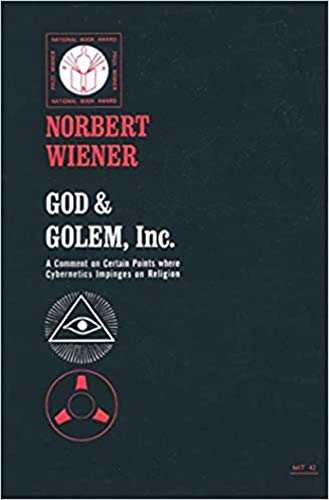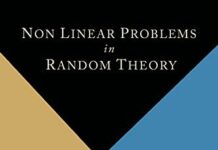
Ebook Info
- Published: 2020
- Number of pages: 58 pages
- Format: PDF
- File Size: 20.43 MB
- Authors: Norbert Wiener
Description
The new and rapidly growing field of communication sciences owes as much to Norbert Wiener as to any one man. He coined the word for it—cybernetics. In God & Golem, Inc., the author concerned himself with major points in cybernetics which are relevant to religious issues.The first point he considers is that of the machine which learns. While learning is a property almost exclusively ascribed to the self-conscious living system, a computer now exists which not only can be programmed to play a game of checkers, but one which can “learn” from its past experience and improve on its own game. For a time, the machine was able to beat its inventor at checkers. “It did win,” writes the author, “and it did learn to win; and the method of its learning was no different in principle from that of the human being who learns to play checkers.A second point concerns machines which have the capacity to reproduce themselves. It is our commonly held belief that God made man in his own image. The propagation of the race may also be interpreted as a function in which one living being makes another in its own image. But the author demonstrates that man has made machines which are “very well able to make other machines in their own image,” and these machine images are not merely pictorial representations but operative images. Can we then say: God is to Golem as man is to Machines? in Jewish legend, golem is an embryo Adam, shapeless and not fully created, hence a monster, an automation.The third point considered is that of the relation between man and machine. The concern here is ethical. “render unto man the things which are man’s and unto the computer the things which are the computer’s,” warns the author. In this section of the book, Dr. Wiener considers systems involving elements of man and machine. The book is written for the intellectually alert public and does not involve any highly technical knowledge. It is based on lectures given at Yale, at the Société Philosophique de Royaumont, and elsewhere.
User’s Reviews
Reviews from Amazon users which were colected at the time this book was published on the website:
⭐Anyone familiar with the subject matter and how it relates to the greater issues individuals in society are facing philosophically, practically, and morally today will gain deeper understanding from the ideas in this book. There’s knowledge in science but great wisdom in holy scripture for those with eyes to see…
⭐A wonderful little gem from the early 1960s.
⭐Excellent.
⭐Weiner was something of a revolutionary in his time. He (among others) pushed the revolution in computing out of the slipstick era. He, at the height of the Cold War, wrote for audiences in both the USSR and the USA. Small wonder that he took on religion. I mean that he took it on as a duty and companion, not as an opponent, though many might have seen opposition.Much of this book lacks direction. He skims issues that are still contentious, including the right to die. His arguments about self-reproducing machines tend twaords the vague, although he admits that he avoided tedious precision. Many of his points are clear and sharp, however. Drawing on the genie in the bottle, the Sorcerer’s Apprentice, and other popular literature, he argues that the capabilities of technology steadily run ahead of our ability to predict and mitigate its consequences. He also notes, during first light of the transistor age, that “Living matter has a fine structure … [approached by] machines which operate according to the principles of solid-state physics.” As usual, technological optimism carried him well beyond justifiable extrapolation. Also as usual, he had a fair inkling of how today’s 0.1 micron transistors might compare to 1.0 micron brain cells.His sharpest commentary starts in the faith that scientists and engineers are moral people, and work in the belief of the human good that comes from their life’s work. (Please, don’t descend to the belief that we think we are evil people reveling in evil outcomes.) Weiner notes that the deepest hell in Dante’s Inferno is reserved for the sin of simony – directing the Church’s good power to personal gain, using the force of money. He draws a direct analogy to the sin of corrupting vast technological power towards personal gain, also using money as controlling force. If you’re already queasy about the amorality of the MBA’s “bottom line” ethos, this may give you some very bad dreams.It’s an important book. It’s flawed, but has the honesty to ask hard questions. It also has the courage to attach a moral sense to the analytic trait of mind – it ought not be surprising that the two fit closely.Among all the quotable lines in this book, one stands out: “… remember that in the game of atomic warfare, there are no experts.” Here, now, under the president that demolished 30 years of arms control treaties, it’s a phrase to remember.//wiredweird
⭐In reviewing this book I feel a little like Icarus. I feel afraid to fly to close to the sun of Norbert Wiener’s genius, herein exposed full force. For example, have you ever been asked the chicken and egg question? Norbert Wiener answers thusly, “a hen is merely an egg’s way of making another egg..” Contrast this with “The Selfish Gene” which took Richard Dawkins a whole book to say. (See my review of this book elsewhere at Amazon.com.)The subtitle sets forth, in brilliant compaction, the theme of this essentially extended essay: “A Comment on Certain Points Where Cybernetics Impinges on Relgion.”First, Wiener considers machines which learn.Next, Wiener considers machines which reproduce themselves.Wiener’s work anticipates the entire modern field of bioethics. As Wiener says in his final chapter, “I have now run through a number of essays that are united by covering the entire theme of creative activity, from God to the machine, under one set of concepts. The machine, as I have already said is the modern counterpart of the Golem of the Rabbi of Prague.” If you are concerned about cloning, or man playing God, I urge you to buy and study this book.
⭐This is a useful historical text to consider in debates about how far to entrust decisions to search engines, expert computer systems, unmanned aerial vehicles, and other automated agents. Wiener, succinctly and with persuasive examples, makes an argument similar to Joseph Weizenbaum’s Computer Power and Human Reason about the necessity of drawing on the judgment of people. Short as it is, this book meanders somewhat. One could easily become derailed near the beginning with some highly speculative technical mumbo-jumbo (it almost seems that Wiener threw it in for that purpose), and he also digresses for commentary on the U.S.-Soviet ideological battles of the day. Furthermore, religious references are restricted to the very beginning.
⭐”God and Golem, Inc.” by Norbert Wiener is a curious set of publications united under one title. It looks like all today’s inventions and science paradigms were discovered long time ago. Would be interesting for A.I. and IT researchers.
Keywords
Free Download God and Golem, Inc.: A Comment on Certain Points where Cybernetics Impinges on Religion in PDF format
God and Golem, Inc.: A Comment on Certain Points where Cybernetics Impinges on Religion PDF Free Download
Download God and Golem, Inc.: A Comment on Certain Points where Cybernetics Impinges on Religion 2020 PDF Free
God and Golem, Inc.: A Comment on Certain Points where Cybernetics Impinges on Religion 2020 PDF Free Download
Download God and Golem, Inc.: A Comment on Certain Points where Cybernetics Impinges on Religion PDF
Free Download Ebook God and Golem, Inc.: A Comment on Certain Points where Cybernetics Impinges on Religion





